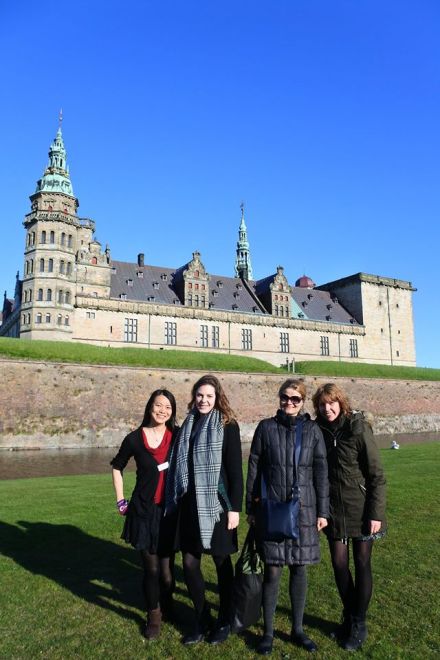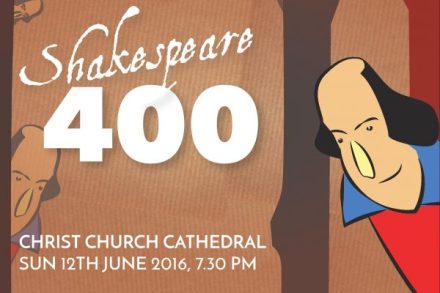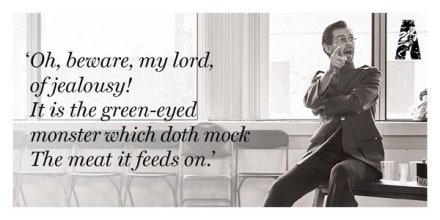Guest post by Emer Murphy
As the most celebrated playwright ever to put ink to paper, it remains astonishing that so little is known about William Shakespeare’s personal life. However, in an imaginative and intriguing one-act play, as part of the Cork Midsummer Festival, Ger FitzGibbon, former head of Drama and Theatre Studies in UCC, delves into the sparse facts of Shakespeare’s private life, a life in Stratford-Upon-Avon. The Bed, a one-woman play co-directed by FitzGibbon and Jack Healy, gives the stage to Shakespeare’s widow, Anne Hathaway, as she reflects on the life of her late husband, and reacts to the contents of his will in the aftermath of his death.

Shakespeare’s will (1616)
Starring Paula McGlinchey (who has featured in previous Shakespeare productions as well as in BBC’s Line of Duty), the play is set in April 1616, and takes place in the bedchamber Shakespeare once shared with his wife. This setting helps to separate the private man from the celebrated playwright who wrote for the London theatres and the court. The play serves as a platform for the wife and the life Shakespeare left at home in the country and it is Hathaway’s subjectivity which maintains the focus. Performed in Cork’s Unitarian Church, the unique, limited capacity space offers a more intimate scene for Hathaway’s reminiscing as the audience forms an L-shape in close proximity to the stage, allowing us to intrude on the private thoughts of the protagonist, thereby creating a bond between the subject and the audience and placing us firmly on Hathaway’s side.

Oak bed c.1650-1700 – image copyright Victoria and Albert Museum, London
Having bequeathed most of his belongings to his eldest daughter Susanna, Shakespeare leaves Hathaway with his “second best bed”, an object which dominates the stage. The playing space itself takes on the shape of a large-four poster bed as single wooden shafts stand at the four corners, anchoring a cloth canopy above the stage, effectively mirroring a bed. The action of the play, therefore, whether intended or not, takes place on a bed, firmly confining it to the private sphere between a husband and wife. Within this domestic space, Hathaway frequently addresses her dead spouse and remembers their more intimate moments together, along with the challenges their marriage faced.
Issues of widowhood and the social alterations and ambiguities that accompany it are addressed in the play, raising concerns about the reality of a widow’s legal rights. McGlinchey’s powerful performance combines light and dark, despair and humour, and sees both laughter and tears as she commands the stage, displaying a range of emotions as she tries to adjust to the reality of her husband’s death and her changed situation, where “widows [are] shoved off into corners”. Now relegated to a lesser room in the house, she is left eating cold mutton and barley with no spoon!
She portrays moments of deep, silent contemplation along with occasions of loud, emotional outbursts as she recounts the death of their son, Hamnet, along with an array of both turbulent and blissful episodes in their marriage. Challenges such as his mother’s belief that Anne had “snared her innocent [son]” shadowed their union. Other personal insights into their relationship make Shakespeare all the more human for the audience as Anne recalls how it infuriated her when he would write down her words when she was “trying to have a fight with [him]” after his long periodical absences from home.

Shakespeare’s family circle – engraving by unknown German engraver, c.1890
Despite their differences, however, their marriage was not completely clouded in darkness and pain, as she remembers fondly their more affectionate moments picking blackberries, and “playing and making lewd verses”. Her discovery that he kept her apple-wood whistle brings a shadowy smile to her lips and softens her resolve as she realises that he brought mementos of her to London, adding to the dynamic of her grief. Her tenderness, however, is short-lived and replaced with a knowing scoff as she acknowledges how it has “dried out from lack of use”. Such contrasting emotions heighten the already poignant atmosphere as other such personal memories pour out as she remembers the intricacies of their marriage.
The raw emotional scenes of the play are complimented by Irene Buckley’s original music scores, which alter the atmosphere dramatically. The music heralds a shift in mood for Hathaway, seeing her transported to a distant memory from the past. At one point in the production, soft, tranquil music begins to echo as her eyes glisten with oncoming tears while she recalls the summer they married. The music cuts unexpectedly and anger replaces grief as she shouts “get out of my head”; she is a woman in mourning and McGlinchey’s performance depicts this in a moving manner.

Twelfth Night – Folio
One of the more notable features of the play, however, is the repeated references to some of Shakespeare’s most famed work. Hathaway accounts for aspects of their lives that inspired the plot of plays, including Twelfth Night. The appropriation of this comedy serves to make Shakespeare’s grief for his dead son all the more real as he determines to provide a happy ending for his family who “all teared up” when the twins are reunited. Hathaway details how the play held a special significance for their daughter, Judith, who was driven to near madness after her twin’s death. Noting that many of her husband’s plays were characterised by loss and confusion, Anne provides a glimpse into the personal motivation that influenced him. The Merchant of Venice is echoed loudly in the play with the discovery of a chest that Shakespeare left under the bed, containing an assortment of treasures and keepsakes, amongst which hides a lost play. Naturally, Hamlet also earns a reference when a mask recalling Yorick’s skull is found. Numerous other plays are woven into the plot and quoted from throughout, including Antony and Cleopatra, As You Like It and King Lear, reminding us of the renowned playwright who has inspired Anne’s tears and anger.
The 65 minute production effectively portrayed the multi-faceted journey of grief and the range of emotions that accompany it.
Guest post by Emer Murphy, postgraduate student on the MA Texts and Contexts: Medieval to Renaissance at University College Cork.
















